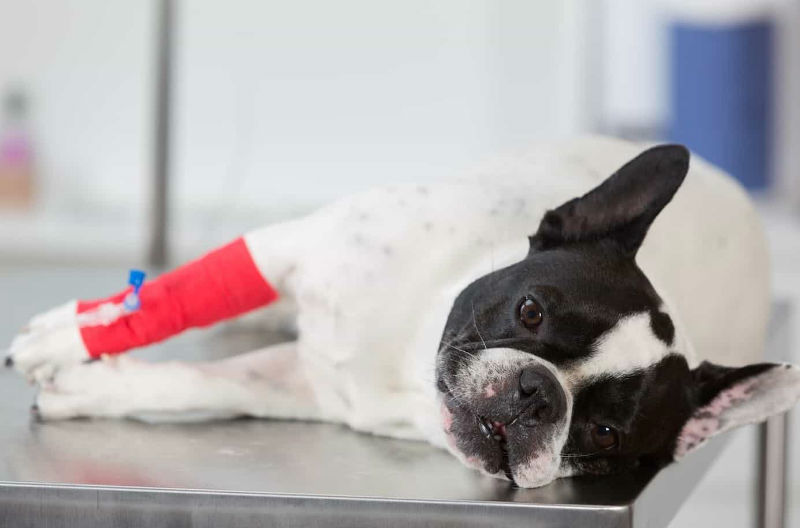Being the isolation tech is like having a bad case of the cooties. People behave like a playground full of 7-year-olds who haven’t had their cootie shots. You’re icky.
I particularly remember a case a couple of years ago, when I became the clinic’s isolation technician for the day. In that clinic, it wasn’t a job that came up often. Over the years I’ve been a technician, I’ve seen very few cases that needed to be quarantined – so few, in fact, that the clinic’s manager had just filled the tiny isolation ward with the new computer equipment. He thought it would be a good storage spot for the two days until the equipment was installed. Of course, that meant we were due for a case of hemorrhagic diarrhea.
You know those drug commercials that end with some fast talker listing off side effects worse than the disease while showing a montage of blissful people running along the beach? It’s not uncommon for the words “rapid, greasy discharge” to come up. This little dog of ours had a bad case of…. well he needed to be quarantined.
It was a busy day at the clinic and he had been dropped off for an exam and treatment. We didn’t yet have all the information from the owner. At first glance, his symptoms suggested parvovirus, which is very contagious. He was put on intravenous fluids and the isolation ward was cleared out.
Being designated the isolation technician brings me back to my childhood. One of my younger brother’s favourite phrases was “You touched it last!” – meaning you have to clean it up, I am running away. In my memory, the phrase has a Doppler effect, as he ran by throwing something at me before anyone could pin the mess on him.
My coworker and I had both “touched it last”. She was ready to rock-paper-scissors for the case, but my shift for the day ran later than hers. I would have to pack up the little dog for his trip to the overnight hospital and I would have to clean up his diarrhea anyway. Again. And again. It just made sense for my co-worker to change her scrubs and return to the untainted masses. I became the cootie queen.
This is the life of the isolation technician. Everyone gives you a wide berth. No one will let you near the cookies in the break room. One kind soul used sterilized forceps to pass me a cookie, provided I scrubbed up to the elbows and held my hand out flat for her to drop the cookie. I was an outcast for the day.
My coworkers weren’t avoiding me for selfish reasons. Humans can’t catch parvovirus, but viruses can travel on your skin and clothes to the next dog you touch. No one wanted to contaminate the clinic or carry the disease home to their dogs. If you do pick up the virus, there’s no neon green patch to tell you what part of your shirt or hand is carrying a virus. You can’t see it. It’s safer to keep the staff and clinic as contaminant free as you can. Or as one co-worker put it, “Can you bleach that since you’re dirty already?”. No respect for the lepers.
By the end of the day, I’d lost track of how many pairs of gloves I’d gone through and how many pee pads the little dog had used. He was transferred to the emergency clinic overnight. We had gotten more information from his owner and it was unlikely to be a case of parvovirus. His up to date vaccine status played a role in the diagnosis, as did the report of leftover bacon fat. It was “just” a case of pancreatitis. The pancreas is a little blob of tissue tucked in the folds of the small intestine. A very fatty meal can damage the pancreas, which makes a dog very sick until the pancreas heals. This little buddy spent 5 days in the hospital, on fluids, while his guts healed. It was still good news. If he didn’t have parvovirus, we weren’t looking at a new outbreak in town. If he had it, there could be several dogs that were carrying the disease around and spreading it, before showing any sign of being ill. With regular vaccination, parvovirus is one more illness you barely see anymore, though it still exists in Canada.
In case you are wondering, yes, there is a test for parvovirus. It requires a fecal sample and can be run in hospital. Like all tests run in the hospital, the kit and chemicals required to run it have an expiration date. Hospitals rarely see parvo cases these days, as pet owners are much better about vaccinating against the disease. Our last test kit had expired, and we hadn’t yet received a new order. It was safer to quarantine the little buddy until we knew for sure what was going on. It’s even safer to keep your dog’s vaccines up to date, as this family had.
Unfortunately, there is no vaccine for bacon fat.
Written by Baleigh McWade



